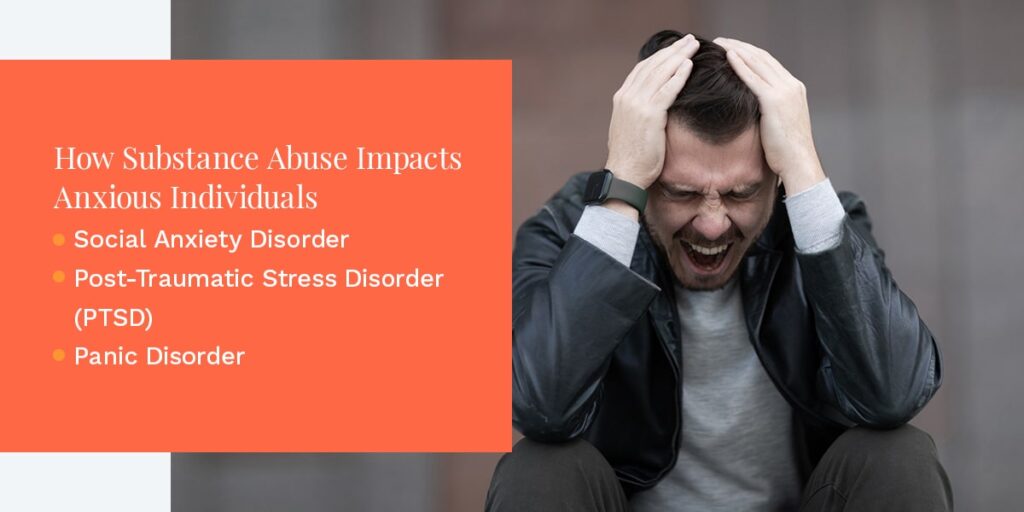People with anxiety are more likely to experience substance use disorder at some point in their lives compared to the general population. More than one in four adults who have a serious mental health problem like anxiety also have a substance use problem. These conditions can occur bidirectionally, where anxiety can precede addiction and vice versa.
Social anxiety can severely impact a person’s daily life, causing some to self-medicate their symptoms with alcohol or other substances. However, side effects from certain drugs can also worsen anxiety symptoms. Fortunately, anxiety and addiction are treatable. Discover how anxiety relates to substance abuse and how to get help.
How Does Anxiety Relate to Substance Abuse?
While people may experience anxiety and substance abuse independently, these conditions often co-occur, which can be a vicious cycle. In other words, those with addiction also tend to have anxiety or other mental health condition. The relationship tends to occur when people turn to alcohol or drugs to relieve social anxiety symptoms.
Social anxiety is more than just normal nervousness or shyness. It is a condition that brings fear, anxiety and avoidance. These feelings interfere with relationships and make it difficult for people to interact with others. People with social anxiety often experience an intense fear of being watched and judged by others, which can severely impact work, school and other daily activities.
It’s common for people with anxiety and alcohol addiction to drink heavily in social situations to relax. They may find drinking helps them loosen up and talk to others more easily. That’s because substances like alcohol can lower inhibitions and slow the central nervous system, providing temporary feelings of relaxation and confidence.
While some substances may temporarily provide relaxation, relying on them may lead to unhealthy dependence. And while numbing the anxiety with alcohol or drugs may make you feel better in the short term, substances won’t help heal the condition. In fact, anxiety is often a symptom of drug withdrawal, showing how you truly cannot escape anxiety by taking substances.
How Substance Abuse Impacts Anxious Individuals
Substance use disorder can impact already-existing anxiety disorders. People with anxiety may find that alcohol and other substances worsen their anxiety symptoms and create new mental health challenges.
Addiction can also physically damage the body. Rather than gaining control over the anxiety, substances can make you lose control and create challenges that make it even more difficult to get through the day. As a person’s body develops tolerance to drugs or alcohol, they need to increase their intake to get the same initial effects. This can lead to a dangerous cycle of addiction that can be challenging to overcome without professional treatment.
Over time, substance abuse and anxiety disorder symptoms can become indistinguishable. Here’s how substance use can impact different anxiety disorders:
Social Anxiety Disorder
The co-occurrence of substance abuse, particularly alcohol addiction, is common among people with social anxiety disorder. People with the condition may initially report feeling less anxious when they drink alcohol. However, alcohol often makes social anxiety worse and intensifies symptoms like worry, muscle tension, irritability and poor concentration. Alcohol addiction usually develops after the onset of social anxiety disorder.
Post-Traumatic Stress Disorder (PTSD)
PTSD and addiction commonly occur together. People struggling with PTSD often turn to substances to cope with their anxiety, though they can often intensify PTSD symptoms like anxiety and depression or feelings of numbness, anger or irritability. In fact, parts of our brain are affected similarly by both substance use disorder and PTSD. Studies show chronic exposure to substances can cause long-term changes in our reward processing that might promote an escalation of addiction.
Panic Disorder
Alcohol and other substances can cause panic attacks, and panic disorder is a risk factor for relapse among those with an addiction. People may turn to alcohol after experiencing symptoms of a panic disorder in hopes it will prevent further panic attacks.
Are People With Anxiety More Likely to Get Addicted?
People develop addictions for many different reasons, though research suggests people with anxiety are more likely to develop an addiction. This often occurs because people turn to substances to relieve anxiety symptoms.
As anxiety symptoms progress, many people may turn to substances to avoid their feelings or because they prefer to feel numb than anxious. Substance abuse and anxiety disorder symptoms can often mimic one another, making it difficult to seek treatment.
Common substances associated with anxiety disorders include:
- Benzodiazepines
- Methamphetamine
- Cocaine
- Marijuana
- Stimulants
- Alcohol
Anxiety can go undiagnosed when substance use is involved since many side effects of substances can mask symptoms. You may not even be aware that you have anxiety when you take substances whenever you’re feeling stressed. For instance, if you drink daily to relieve anxiety, you might not consider tension a symptom of a mental health condition.
When a person discovers that they have a treatable mental health condition like anxiety, the diagnosis can often provide relief. There are many healthy ways to treat anxiety that don’t involve substances. For a successful recovery, you must prioritize both your addiction and social anxiety in treatment.
Social Anxiety Alcohol Alternatives
You can successfully manage your social anxiety without alcohol, but it will take experimenting to find what works best for your needs. Here are a few tips:
- Talk to someone you trust: You can start understanding your anxiety triggers and how to deal with them by discussing them with a trusted person. You might talk to a counselor, 12-step sponsors, friends or family to learn how to cope effectively with your anxiety.
- Challenge negative thoughts: Social anxiety can make you jump to conclusions that aren’t rooted in reality. When you start feeling anxious, remember that nothing bad will happen and challenge any harmful thoughts you may have about yourself.
- Practice mindfulness: Anxiety can cause us to dwell on past failures or worry about the future. Mindfulness routines can help you focus on the present and calm symptoms. Options include yoga or deep breathing exercises.
- Exercise: Exercise is an excellent way to combat anxiety. Staying active can help reduce stress, provide a healthy outlet for your emotions and help you sleep better.
- Take care of your body: Anxiety can often come from poor diet and sleep habits. Getting rest and enough nutrition every day can improve your overall health and help you reduce anxiety.
- Consider medication: If you find it challenging to manage your social anxiety through lifestyle changes alone, you can always talk to your health provider about prescription medications to manage the condition.
While you don’t need alcohol to manage your anxiety, you might feel pressured to consume alcohol when around others who are drinking. In these cases, you can offer an alternative, such as going for a walk, playing a game or grabbing coffee. And if you find yourself in a challenging situation, remember that you can always leave.
Start Your Recovery Journey at Transformations by the Gulf
Social anxiety and substance use disorder are conditions that often worsen one another. At Transformations by the Gulf, we can help you understand how your anxiety and addiction are connected. Our professional addiction treatment center addresses the causes and symptoms of addiction to help you heal from co-occurring conditions like anxiety. You can begin taking back control of your life and adopt coping skills to achieve a healthier, happier lifestyle.
To start your recovery journey, contact us today.
If you or someone you know would like to know more about Transformations by the Gulf Substance Abuse Treatment Center Give us a Call 24/7 (727)498-6498
The success of a person’s recovery depends on the level of personalized treatment provided. It is important to find an addiction treatment program that works. When we say our treatment is individualized, we mean that we craft a program that is tailored to address the client’s unique physical, mental and emotional needs.
In the client’s first 24 hours with us, we’ll evaluate their current state and work to understand what challenges they need to overcome. They’ll also have an initial session with our doctor and meet with one of our licensed mental health professionals.
After the initial evaluations, we’ll design a treatment plan with the sole mission of helping the client overcome and heal from addiction. Their program will focus on things such as:
- Addressing and Identifying root causes of addiction.
- Creating a support system.
- Developing healthy stress management techniques.
- Eliminating Substance use.
- Learning how to communicate emotions effectively.
- Maintaining a healthier lifestyle.
- Repairing damaged relationships.
Our Facility is near the beach and offers a comfortable setting for substance abuse treatment and recovery.
What a Day is Like in Our Treatment Facility.
Why Transformations by the Gulf?

